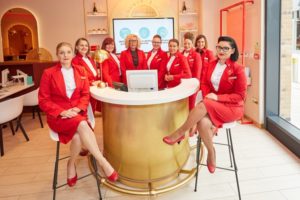Virgin Holidays has opened the first of four new V-Rooms planned this autumn.
Its Chelmsford store opened on Friday October 25, and will be followed by new standalone shops in St Albans from November 13, Leeds from November 27 and Liverpool from December 10.
It takes the agency’s retail network up to 18 V-Rooms, alongside its concession stores – of which it has more than 30 across the UK inside fashion retailer Next.

More: Virgin Holidays opens flurry of Next concessions
More: Virgin Atlantic plots Manchester hub
Managing director Joe Thompson said the new V-Rooms were a mixture of replacing concessions for larger stores, such as in Liverpool, and entries into new locations, like in St Albans.
“When we are looking at our retail estate we are looking at where our existing customer are based,” said Thompson. “We have demographic information and match that up with the stores and locations we already have to make sure we optimise our coverage in each city.”
Thompson said sister airline Virgin Atlantic’s recent acquisition of Flybe – which will be renamed Virgin Connect next year – means more retail locations will be in touching distance of connectivity to the long-haul flights that serve Virgin’s vertically-integrated holidays.
“Proximity to the airports that our flights go from is one of the factors we look at [when opening new stores],” he said. “We have a national footprint, but with the addition of Flybe it gives us many more opportunities to fly customers long-haul with a connection from their local airport.”
When asked about the vertically-integrated model, which many commentators blamed for Thomas Cook’s collapse, Thompson said the demise of Cook was a “combination of factors” and left “additional demand in the market”.
He added: “At Virgin Holidays we are very focussed on where our strengths are. We have tailored the size of our retail estate and have the right to win customers in these areas.
“We are very comfortable and happy with the vertical role retail plays in our business – and there continues to be a role for the face-to-face selling of holidays.”
He stressed the importance of retailers combining their sales channels, adding that Virgin Holidays is exploring options around starting sales conversations on social media platforms.
“We know that the vast majority of our customers interact with us across two or three of our distribution channels,” Thompson explained. “Their first port of call might be the website, then the telephone, then in-store. We are not there yet, but we see a real opportunity to join those up. Customers expect to be able to contact you on their channel of choice.”
He added that there is a growing focus on Virgin’s appointments system, which is particularly popular in the turn-of-year peak selling season.
Virgin Holidays’ specialism in the long-haul market meant it was more protected from customers feeling more comfortable to book online, Thompson added. “For a lot of customers its not the type of holiday that they are booking every year, it’s special – like taking the family to Florida or booking a honeymoon. That can be quite a high-pressure purchase so you might feel like you want to talk to an expert. And [Virgin Holidays] being focussed on our product offering allows us to be real experts. That creates a sweet spot for face-to-face sales.”
Thompson said there would be some “exciting developments” at the Leeds and Liverpool stores, but would not reveal them ahead of the launches in the northern cities. But he said “the holiday starts in the shopping phase” and suggested Virgin could roll out virtual reality in the stores.
“The important thing [for shops on the high street] is to keep evolving. It’s really important for us to give customers a reason to step outside of their front doors and visit stores. Bringing the holiday to life is something we are really trying to do.”
